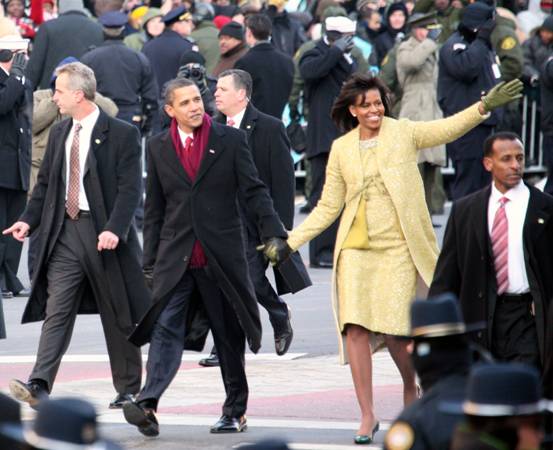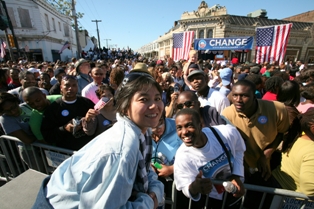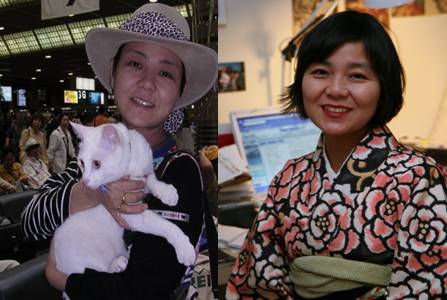Japanese journalist Keiko Tsuyama is a woman with many firsts. This is largely due to timing and tenacity. Her latest project was to cover Barack Obama's presidential campaign for Japanese readers, from the Iowa Caucus to the Inauguration.
"I would definitely like to interview President Obama and ask him why never once has he mentioned Japan," she says, Or why a search of the White House's much-touted new website brings up only references to Japan related to World War II, "which happened rather long ago." Japan is now one of America's staunchest allies. What else can the President say about our bi-lateral relations?"
Keiko graduated from one of Japan's most elite institutions, Tokyo University of Foreign Studies, at the same time Japan's Parliament mandated that women be hired on an equal footing to men. Beginning with Kyodo News, Japan's Associated Press, Keiko became Japan' first woman business writer - one out of seventy men.
 The President's Inauguration (photo: Global Photo Exchange).
The President's Inauguration (photo: Global Photo Exchange).
She then moved on to the New York bureau, becoming the first female Japanese news correspondent in North America and the first female placed with a major overseas branch of a Japanese news agency.
Her stories ran regularly in the Nikkei, Japan's Wall Street Journal, with 4 million readers; the Asahi, a national paper similar to USA Today, with 6 million readers; and an even larger national paper, the Yomiuri, with 9 million readers.
She arrived in New York City post-9/11, but in time to cover Martha Stewart's verdict. "Business stories are about corporations, sure," she says in her Americanized English, "But ultimately they are about people. There is always a human element that adds to the drama."
Capturing that drama is what leads her to her stories, from interviewing the heads of Google and LinkedIn to the McCain-Obama presidential debates of last fall. Keiko enjoys drama, which is what she got when in 2006, tired of the restraints of the traditional Japanese corporation, she left her job-for-life to become a freelancer. Her employer and her family thought she had gone mad.
 Covering an Obama rally in Philadelphia during the election.
Covering an Obama rally in Philadelphia during the election.
Today, Keiko writes for magazines and papers around the world, from a Japanese perspective. She has interviewed Steve Chen, founded of YouTube, yet she is most impressed by "ordinary Americans. The people of the United States are so unique I find them particularly exciting to interview."
 Keiko is a woman with feet in two separate worlds.
Keiko is a woman with feet in two separate worlds.
Just before Christmas, she found herself in Wisconsin, where she interviewed employees of a 90-year-old GM plant as it closed its doors. She hopes to return in the spring to continue to record the economic impact of a global meltdown on plant employees far from New York and Tokyo. "It was very sad. Those people loved that factory, and they just lost everything."
New York City is where her heart lies. "We have everything here," she says. "New York is totally different from the other thirty states I have visited so far. It is where I want to live." One American she would like to talk to more than any other is one that studied here at Columbia University, President Obama.
Money matters. Keiko would like to interview Warren Buffet, David Rockefeller, and Bill Gates. The themes of wealth and philanthropy intrigue her. "In Japan there are no leaders like these. We have no tradition of extremely rich men giving back to society. This is so American."
Why do Americans give so much? Is the concept of individual and corporate social responsibility truly American? How can the new president ask Americans to give even more? These are the questions Keiko hopes to answer and communicate to her readers in Japan, where she says there is little concept of giving back.
The American corporation is also different from its Japanese counterpart. "The biggest difference between the two," Keiko explains, "is that in the U.S., management cares more about its investors, where as in Japan the company traditionally takes care of its employees."
Wall Street bonuses also set America apart, catching her attention as much as Andrew Cuomo's. "In tough times like these, the top level management of Japan's companies get salary decreases before the mid-level employees get laid off."
Keiko likes journalism, but also plans to be an author. "As a journalist I attempt to be neutral, but as a writer I can show more of myself."
As it happens, I studied at Waseda University in Tokyo about the same time Keiko was at Tokyo U., although we never met there, Like Keiko, I enjoyed traveling my host country looking for stories. Unlike Keiko, almost everything I did had been done by other Americans before. As a Japanese woman journalist outside of Japan, Keiko Tsuyama is truly a trail blazer. I don't doubt that Barack Obama will realize that a few minutes into their first interview.Edited by Ethel Grodzins Romm